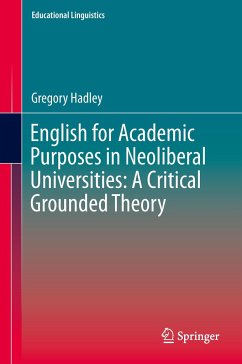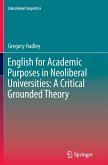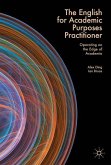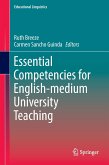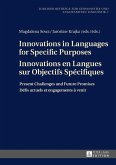The critical grounded theory presented in this book offers valuable insights on the social processes and strategies used by Blended English for Academic Purposes Professionals (BLEAPs) at higher education institutions, as they struggle to negotiate the challenges arising from a new focus on recruiting international students and hunting for other resources for their universities. Drawing from in-depth interviews with numerous research participants at over eleven higher educational institutions in the UK, Japan and the United States, this work focuses on those who have been precariously placed as middle manager at many EAP and TESOL programs. Lacking in both positional power or permanence, these 'BLEAPs' are faced with many challenges as they seek to understand their changing role in higher educational institutions, and engage in strategies that can help them gain greater control over issues in their profession.
"Hadley's methods are detailed, systematic, and are sure to appeal to those interested in grounded theory research. With phrases such as 'resource leaching' and 'milking the cash cow', the concepts vividly illustrate theory in a way that is a welcome departure from the hedged and objectivized language common in ELT literature. ... the book does a masterful job in linking contextual factors to changes happening in EAP." (Colin Walker, RELC Journal, Vol. 49 (03), December, 2018)
"Gregory Hadley's book draws on fields such as management theory, organizational culture, organizational behaviour and policy studies as well as the more familiar sociolinguistic terrain that we would expect to see in research of this nature. As such, the book will be of interest to anyone in an EAP management position, or to any EAP practitioner who aspires to a managerial role. ... Hadley's book is a must-read, in other words, for EAP practitioners in neoliberal universities everywhere." (Terri Edwards, Journal of English for Academic Purposes, September, 2017)
"The book's organization follows standard research reporting, containing chapters on the study's concepts, methodology, context and results. This book will undoubtedly be of most interest to so-called BLEAPs, being one of the first to look at the effects of neoliberalisation in the EAP context means that this book makes a substantial and unique contribution to helping all of us who work in the field ... ." (Gemma Campion, OnCUE Journal, Vol. 9 (1), 2016)
"Hadley's book provides a thorough analysis of EAP in universities. It can aid individuals in this area to improve their teaching and learning environments, to chart suitable career paths, and to strive for a better approach to funding and operating universities than a neoliberalist one. Altogether, this ambitious book serves as an excellent primer for the use of grounded theory in educational research, and a rare and compelling description of the roles of teachers and supervisors in EAP." (Gregory Strong, System, Vol. 51, July, 2015)
"This volume is an important and ambitious attempt to address the ways in which English for academic purposes (EAP) programs at the tertiary level have been subject to the ongoing neoliberalization of universities in many countries in the past 40 years ... . this book is an important contribution to the debate needed on the future of not only EAP programs but also on the mission of our public universities in this era of ongoing neoliberal privatization of public funds." (Christian W. Chun, tesol Quarterly, Vol. 51 (4), December, 2017)
"Gregory Hadley's book draws on fields such as management theory, organizational culture, organizational behaviour and policy studies as well as the more familiar sociolinguistic terrain that we would expect to see in research of this nature. As such, the book will be of interest to anyone in an EAP management position, or to any EAP practitioner who aspires to a managerial role. ... Hadley's book is a must-read, in other words, for EAP practitioners in neoliberal universities everywhere." (Terri Edwards, Journal of English for Academic Purposes, September, 2017)
"The book's organization follows standard research reporting, containing chapters on the study's concepts, methodology, context and results. This book will undoubtedly be of most interest to so-called BLEAPs, being one of the first to look at the effects of neoliberalisation in the EAP context means that this book makes a substantial and unique contribution to helping all of us who work in the field ... ." (Gemma Campion, OnCUE Journal, Vol. 9 (1), 2016)
"Hadley's book provides a thorough analysis of EAP in universities. It can aid individuals in this area to improve their teaching and learning environments, to chart suitable career paths, and to strive for a better approach to funding and operating universities than a neoliberalist one. Altogether, this ambitious book serves as an excellent primer for the use of grounded theory in educational research, and a rare and compelling description of the roles of teachers and supervisors in EAP." (Gregory Strong, System, Vol. 51, July, 2015)
"This volume is an important and ambitious attempt to address the ways in which English for academic purposes (EAP) programs at the tertiary level have been subject to the ongoing neoliberalization of universities in many countries in the past 40 years ... . this book is an important contribution to the debate needed on the future of not only EAP programs but also on the mission of our public universities in this era of ongoing neoliberal privatization of public funds." (Christian W. Chun, tesol Quarterly, Vol. 51 (4), December, 2017)

